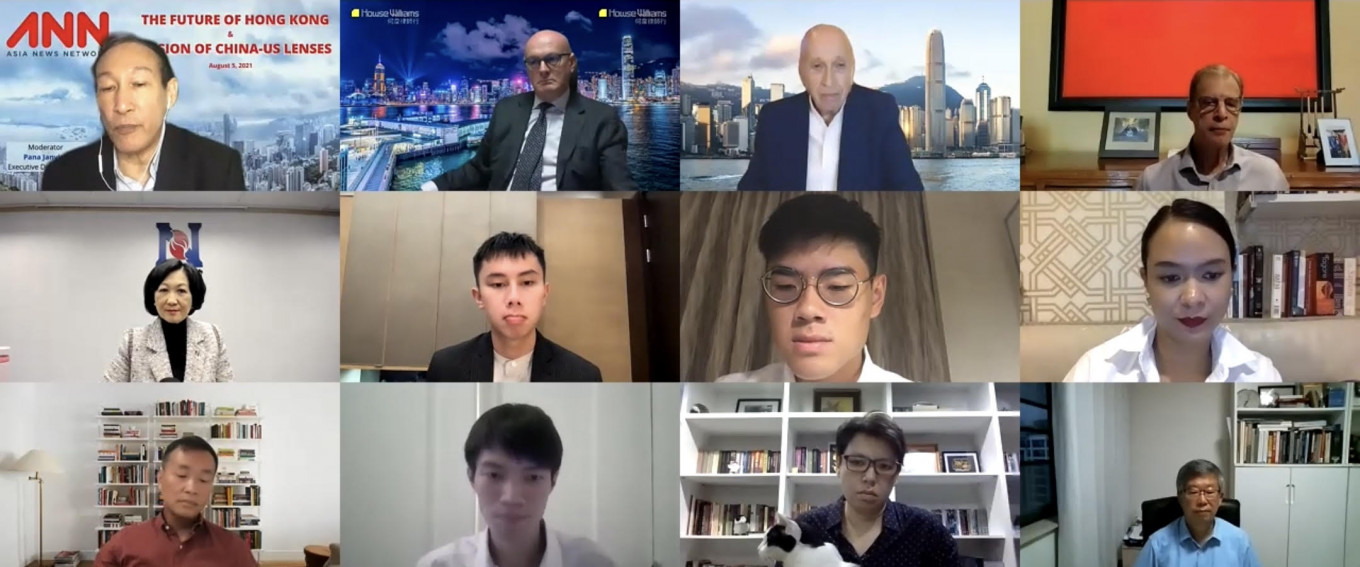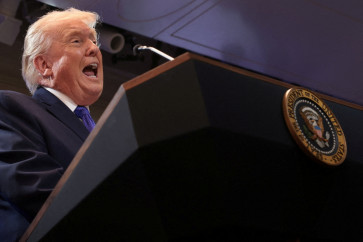Popular Reads
Top Results
Can't find what you're looking for?
View all search resultsPopular Reads
Top Results
Can't find what you're looking for?
View all search resultsSandwiched between superpowers: Is Hong Kong just a pawn in US-China rivalry?
Change text size
Gift Premium Articles
to Anyone
T
he United States and China are unlikely to undermine Hong Kong’s position as the world’s leading financial center in their high stakes jostling for power and influence in the region, according to leading academics from both countries.
Richard Weixing Hu, the University of Macau’s Dean of Faculty of Social Sciences, said that while the stakes are very high for both countries, it is of “vital national interest for China not to let the 'One Country Two Systems' arrangement fail".
William Overholt from Harvard University’s Kennedy School, suggested that while the US policy on Hong Kong, which has included sanctions, is designed to “express disapproval” of the breaches of the city’s Basic Law, it has “no desire to hurt” the people of Hong Kong.
Overholt spent several years working in Hong Kong and was very involved in the island's transition, meeting frequently with China’s top leaders, especially former Chinese premier Zhu Rongji.
Both academics were optimistic on the future of Hong Kong’s economic and financial sectors.
They were speaking at a webinar on “The Future of Hong Kong & Division of China-US lenses” organized on Aug. 5 by Asia News Network, an alliance of 23 national media in 20 Asian countries.
Read also: Hongkongers ponder their future in China's tight embrace
Enze Han from the University of Hong Kong’s Politics and Administration Department said that given the 2019 prodemocracy protests didn’t achieve “anything”, and with the National Security Law in place — leading also to a crackdown on the media — it would be better for Hong Kong to keep a low profile and stay out of the disputes between the two superpowers.
He did, however, suggest that the US could help frustrated Hong Kong youngsters by opening for them the path to immigration. “To be able to migrate abroad will make much clearer sense who they [youngsters] are,” he added.
Hu reiterated that China has a strong economic stake in Hong Kong and to see its successful integration into the Greater Bay Area.
He said the US has commercial interests in Hong Kong and wants to use it as an issue to check on and as a bargaining chip to put pressure on Beijing.
Overholt said there was misconception in the US and western nations, and they were underestimating the public support for the crackdown against the rioters in 2019.
“The majority of Hong Kong supported peaceful protests but the violence by a minority was terrible and there was tremendous anger against violent rioters supporting Hong Kong’s independence and waving the British flag and destroying businesses.”
He was, however, wary of China’s trustworthiness following the crackdown on booksellers, the kidnapping of a businessman (during a holiday in Thailand), termination of the working visa of a Financial Times editor and other actions that “broke all the major promises made to the HK people”.
“All these things have tremendous impacts. The whole western relationship with Hong Kong depends on sensitive information not leaking to the mainland and depends on the functioning of the court system,” Overholt said.
“Also, threatening companies whose employees say something Beijing doesn’t like has a tremendous effect on companies’ decisions on whether to have a major presence in Hong Kong. “Most US companies have already moved to Shanghai and more are going. Actually, they feel safer expressing their opinions in Shanghai than in Hong Kong.”
Overholt noted that Hong Kong remains one of the world’s premier financial centers and is likely to grow even stronger with further opening up of the Chinese financial sector and, ironically, by US pressure on Chinese companies listed in New York.
If China can succeed in breaking up some of Hong Kong’s oligopolies and monopolies, Hong Kong’s economy could become much more competitive than it is today, he said.
To improve for the future, Overholt suggested that China stop overreacting every time people say the wrong thing politically, banning books, punishing a school child for singing a song. “These lead to global publicity, to company HQs asking whether they want to have a big presence in Hong Kong. To maximize Hong Kong’s success is to stop doing these things. They are not necessary for Hong Kong's security, not necessary for China’s security,” said Overholt.
Hu, meanwhile, lamented that US-China relations were likely to worsen before it got better, as each side was driven by domestic political forces. In the US, it is the Congress and interest groups, in China, it is the rise of nationalism.
“Hong Kong is a very hot issue. Washington will continue to use it to demonize China and try to pressure Beijing and showcase the latter’s behavior against the rule-based international order,” said Hu.
Read also: Beijing urges Washington to stop 'demonizing' China
He said Beijing has become very defensive and is trying to defend its commitment to the One Country Two Systems arrangement.
With the National Security Law, it is trying to change things on the ground, and calmness has returned to the city.
“But it will take a long time for the return of hearts. Whether young people will choose to identify with China, it will take time,” Hu added.
He warned the US would only hurt itself by increasing sanctions, while any effort to delink Hong Kong from the US or from the HK dollar would also end up hurting the US.










